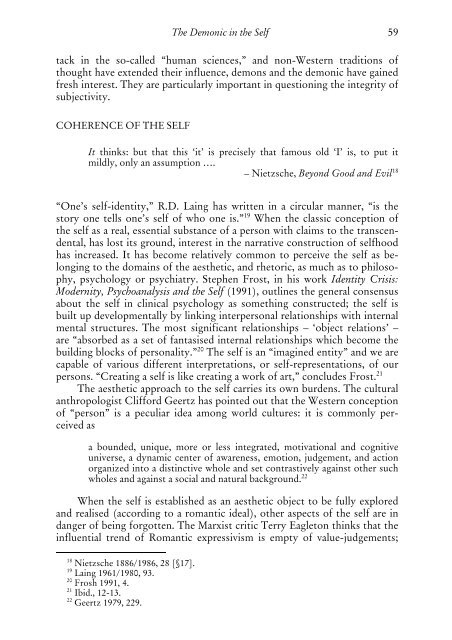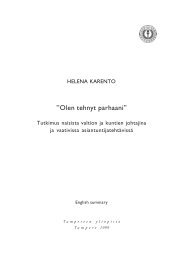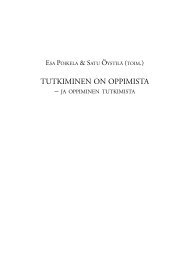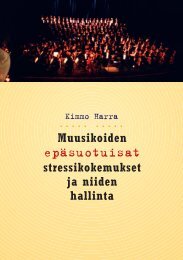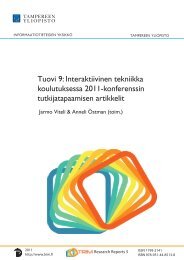Note on this edition: this is an electronic version of the 1999 book ...
Note on this edition: this is an electronic version of the 1999 book ...
Note on this edition: this is an electronic version of the 1999 book ...
You also want an ePaper? Increase the reach of your titles
YUMPU automatically turns print PDFs into web optimized ePapers that Google loves.
The Dem<strong>on</strong>ic in <strong>the</strong> Self 59tack in <strong>the</strong> so-called “hum<strong>an</strong> sciences,” <strong>an</strong>d n<strong>on</strong>-Western traditi<strong>on</strong>s <strong>of</strong>thought have extended <strong>the</strong>ir influence, dem<strong>on</strong>s <strong>an</strong>d <strong>the</strong> dem<strong>on</strong>ic have gainedfresh interest. They are particularly import<strong>an</strong>t in questi<strong>on</strong>ing <strong>the</strong> integrity <strong>of</strong>subjectivity.COHERENCE OF THE SELFIt thinks: but that <strong>th<strong>is</strong></strong> ‘it’ <strong>is</strong> prec<strong>is</strong>ely that famous old ‘I’ <strong>is</strong>, to put itmildly, <strong>on</strong>ly <strong>an</strong> assumpti<strong>on</strong> ….– Nietzsche, Bey<strong>on</strong>d Good <strong>an</strong>d Evil 18“One’s self-identity,” R.D. Laing has written in a circular m<strong>an</strong>ner, “<strong>is</strong> <strong>the</strong>story <strong>on</strong>e tells <strong>on</strong>e’s self <strong>of</strong> who <strong>on</strong>e <strong>is</strong>.” 19 When <strong>the</strong> classic c<strong>on</strong>cepti<strong>on</strong> <strong>of</strong><strong>the</strong> self as a real, essential subst<strong>an</strong>ce <strong>of</strong> a pers<strong>on</strong> with claims to <strong>the</strong> tr<strong>an</strong>scendental,has lost its ground, interest in <strong>the</strong> narrative c<strong>on</strong>structi<strong>on</strong> <strong>of</strong> selfhoodhas increased. It has become relatively comm<strong>on</strong> to perceive <strong>the</strong> self as bel<strong>on</strong>gingto <strong>the</strong> domains <strong>of</strong> <strong>the</strong> aes<strong>the</strong>tic, <strong>an</strong>d rhetoric, as much as to philosophy,psychology or psychiatry. Stephen Frost, in h<strong>is</strong> work Identity Cr<strong>is</strong><strong>is</strong>:Modernity, Psycho<strong>an</strong>alys<strong>is</strong> <strong>an</strong>d <strong>the</strong> Self (1991), outlines <strong>the</strong> general c<strong>on</strong>sensusabout <strong>the</strong> self in clinical psychology as something c<strong>on</strong>structed; <strong>the</strong> self <strong>is</strong>built up developmentally by linking interpers<strong>on</strong>al relati<strong>on</strong>ships with internalmental structures. The most signific<strong>an</strong>t relati<strong>on</strong>ships – ‘object relati<strong>on</strong>s’ –are “absorbed as a set <strong>of</strong> f<strong>an</strong>tas<strong>is</strong>ed internal relati<strong>on</strong>ships which become <strong>the</strong>building blocks <strong>of</strong> pers<strong>on</strong>ality.” 20 The self <strong>is</strong> <strong>an</strong> “imagined entity” <strong>an</strong>d we arecapable <strong>of</strong> various different interpretati<strong>on</strong>s, or self-representati<strong>on</strong>s, <strong>of</strong> ourpers<strong>on</strong>s. “Creating a self <strong>is</strong> like creating a work <strong>of</strong> art,” c<strong>on</strong>cludes Frost. 21The aes<strong>the</strong>tic approach to <strong>the</strong> self carries its own burdens. The cultural<strong>an</strong>thropolog<strong>is</strong>t Clifford Geertz has pointed out that <strong>the</strong> Western c<strong>on</strong>cepti<strong>on</strong><strong>of</strong> “pers<strong>on</strong>” <strong>is</strong> a peculiar idea am<strong>on</strong>g world cultures: it <strong>is</strong> comm<strong>on</strong>ly perceivedasa bounded, unique, more or less integrated, motivati<strong>on</strong>al <strong>an</strong>d cognitiveuniverse, a dynamic center <strong>of</strong> awareness, emoti<strong>on</strong>, judgement, <strong>an</strong>d acti<strong>on</strong>org<strong>an</strong>ized into a d<strong>is</strong>tinctive whole <strong>an</strong>d set c<strong>on</strong>trastively against o<strong>the</strong>r suchwholes <strong>an</strong>d against a social <strong>an</strong>d natural background. 22When <strong>the</strong> self <strong>is</strong> establ<strong>is</strong>hed as <strong>an</strong> aes<strong>the</strong>tic object to be fully explored<strong>an</strong>d real<strong>is</strong>ed (according to a rom<strong>an</strong>tic ideal), o<strong>the</strong>r aspects <strong>of</strong> <strong>the</strong> self are ind<strong>an</strong>ger <strong>of</strong> being forgotten. The Marx<strong>is</strong>t critic Terry Eaglet<strong>on</strong> thinks that <strong>the</strong>influential trend <strong>of</strong> Rom<strong>an</strong>tic expressiv<strong>is</strong>m <strong>is</strong> empty <strong>of</strong> value-judgements;18 Nietzsche 1886/1986, 28 [§17].19 Laing 1961/1980, 93.20Frosh 1991, 4.21 Ibid., 12-13.22Geertz 1979, 229.


